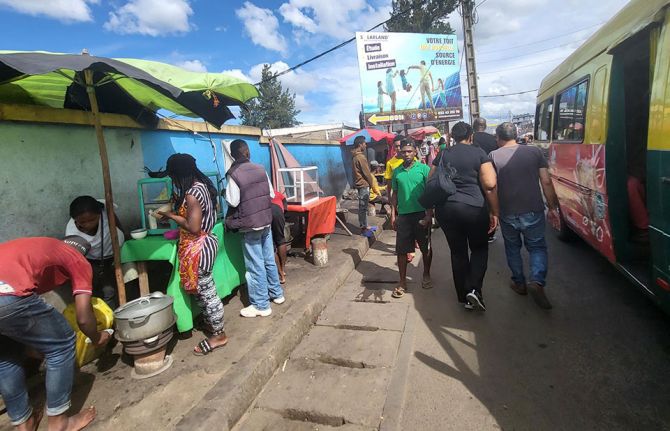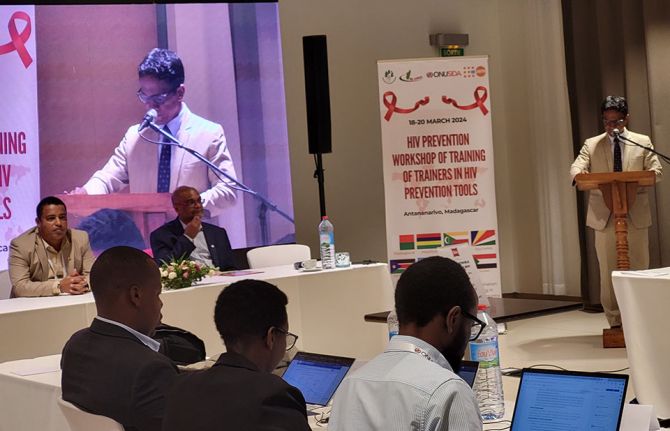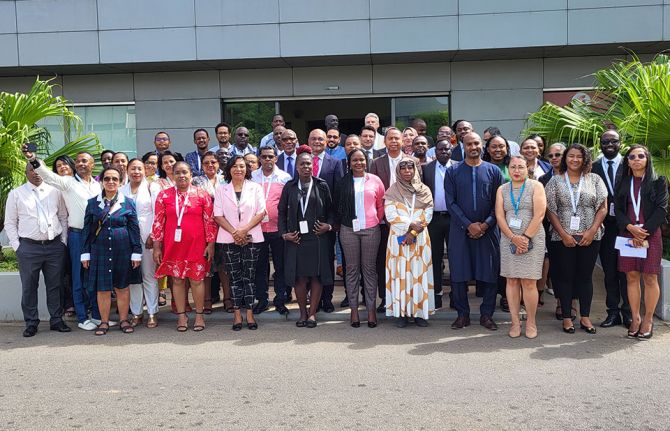



Press Release
UNAIDS urges Indian Ocean Island countries to strengthen HIV prevention to end AIDS
27 March 2024 27 March 2024ANTANANARIVO/GENEVA, 27 March 2024—Despite progress across most of sub-Saharan Africa, UNAIDS warns that gaps in HIV prevention are driving new HIV infections in the Indian Ocean Countries (IOC) and several other countries in Africa. The critical gaps in HIV prevention were the focus of a workshop organized by UNAIDS and UNFPA which was hosted in Madagascar between 18 and 20 March to address some of the barriers to accelerating progress.
Insufficient focus on HIV prevention in a number of African countries including Egypt, Madagascar, Angola, Sudan and South Sudan has resulted in these countries not achieving the proportionate declines in new infections seen in the rest of the region.
For example, the increase in the number of new infections in a country like Madagascar for example, is in stark contrast to the downward trend in Botswana which has seen a 66% decline in new HIV infections since 2010 and 36% decline in AIDS-related deaths during the same period. As a result, Botswana—along with Eswatini, Rwanda and Zimbabwe— are on the path to end AIDS having achieved the global 95-95-95 targets through strong HIV prevention and treatment interventions.
Madagascar, one of the poorest countries in the region, has been hit by cyclical natural disasters including drought and cyclones, making it difficult for the country to recover and mount an effective response to HIV. Madagascar recorded a 151% increase in the number of new HIV infections since 2010, and a 279% increase in AIDS-related deaths during the same period. In addition, just 18% of the estimated 70 000 people living with HIV in Madagascar had access to treatment in 2022, and 3200 people died of AIDS-related illnesses. Sudan and South Sudan are also falling behind on HIV prevention and treatment efforts. Inequalities are exacerbating people’s vulnerability to HIV.
“Local research indicates increases in new HIV infections among key populations, including people who use drugs, and among young women and girls. This could be attributable to many factors including drug routes, recurring cyclones and deep poverty in some areas that is making people more vulnerable to HIV infections,” said Professor Zely Randriamanantany, Madagascar’s Minister of Public Health. “We need our international partners to invest with us before it's too late. This prevention focus is very welcome indeed."
“It is clear from our visits to communities and from speaking to health specialists in Madagascar, that the HIV epidemic is changing. The persistent rise in new infections in Madagascar since 2010, for example, shows that it could spread rapidly if we do not stop it in its tracks immediately,” said Anne Githuku-Shongwe, UNAIDS Regional Director for Eastern and Southern Africa. “We know the path that ends AIDS. It’s not a miracle. It requires strong political and financial support.”
Gaps identified in some countries include a lack of data that would point to where HIV prevention efforts need to focus. Data gathering interventions are key to implementing evidence-informed and effective programmes. Some countries are also lacking commodities, including HIV testing kits and condoms.
“Inadequate investment in HIV responses is holding back ending AIDS as a public health threat,” said Jude Padayachy, UNAIDS Country Director for Comoros, Madagascar, Mauritius and Seychelles. “We need to accelerate the HIV response in the Indian Ocean Island states by ensuring all the basics—making sure people are informed about HIV and how to prevent it, and making sure people have access to HIV prevention services and commodities, such as condoms. We also need to make sure that people who are HIV-positive know their status and get the treatment they need.”
UNAIDS is committed to support countries to accelerate political leadership, investments and better data for prevention.
The meeting in Madagascar brought together HIV experts and programme leaders from a number of countries across Africa to learn from each other and to review and strengthen their national plans on HIV prevention to support countries in scaling up their HIV responses. The meeting included teams from Comoros, Egypt, Madagascar, Rwanda, Sudan and South Sudan.
Participants explored ways to improve data collection to help develop more of an understanding of the dynamics of their HIV epidemics to ensure an effective, evidence-informed, human rights-based response. They also drafted national assessments which will serve as a guide to facilitate dialogues with communities, governments, and partners. This will aid in refining strategies and setting priorities to implement ambitious HIV prevention plans. UNAIDS will continue to support countries in their internal assessments to strengthen their HIV responses.
UNAIDS
The Joint United Nations Programme on HIV/AIDS (UNAIDS) leads and inspires the world to achieve its shared vision of zero new HIV infections, zero discrimination and zero AIDS-related deaths. UNAIDS unites the efforts of 11 UN organizations—UNHCR, UNICEF, WFP, UNDP, UNFPA, UNODC, UN Women, ILO, UNESCO, WHO and the World Bank—and works closely with global and national partners towards ending the AIDS epidemic by 2030 as part of the Sustainable Development Goals. Learn more at unaids.org and connect with us on Facebook, Twitter, Instagram and YouTube.
Contact
UNAIDS JohannesburgBathsheba OKWENJE
tel. + 27 (0) 72 895 5174
okwenjeb@unaids.org
UNAIDS Johannesburg
Robert SHIVAMBU
tel. +27 (0) 83 608 1498
shivambuh@unaids.org
